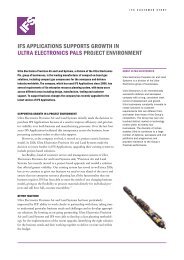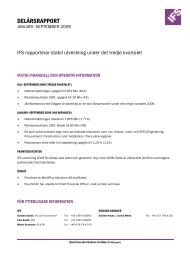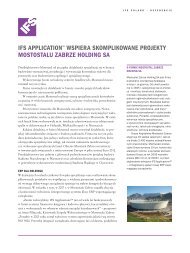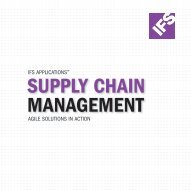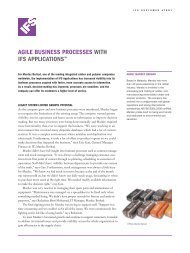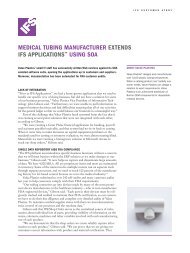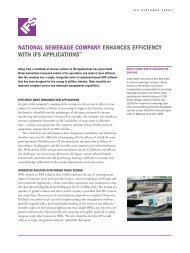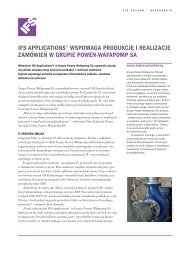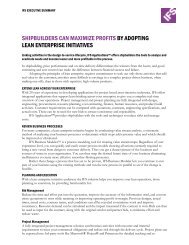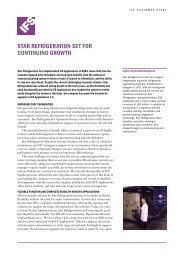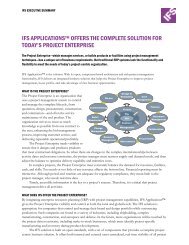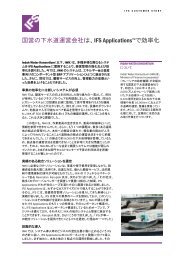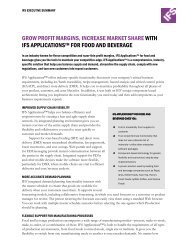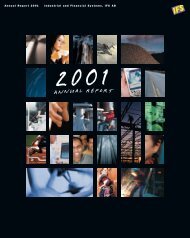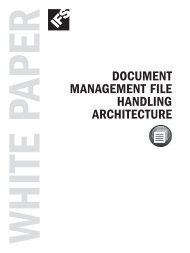IFS Financials
IFS Financials
IFS Financials
Create successful ePaper yourself
Turn your PDF publications into a flip-book with our unique Google optimized e-Paper software.
<strong>IFS</strong> <strong>Financials</strong>
<strong>IFS</strong> <strong>Financials</strong> —the financials solution for the entire<br />
corporation, locally and globally<br />
Is your IT department tired of administering<br />
systems from different vendors in the various<br />
countries where you operate? Is it difficult to<br />
obtain the monthly data you require for financial<br />
control and consolidation? <strong>IFS</strong> <strong>Financials</strong> is a<br />
financials solution that works worldwide, regardless<br />
of whether you choose to let the different<br />
countries use a centralized system or discrete<br />
systems in the respective region/country.<br />
Common misconceptions concerning the primary<br />
role of a financials solution and what determines<br />
how well a particular solution suits various<br />
countries include:<br />
• A financials solution primarily handles<br />
“accounting”.<br />
• Luckily, “accounting” is the same in all<br />
countries.<br />
• Legislation and the authorities in each country<br />
make it difficult to use the same solution in<br />
several countries.<br />
4<br />
Certainly, accounting is a crucial part of a financials<br />
solution—internally to manage the enterprise<br />
and externally to satisfy legal requirements—but<br />
the handling of invoices, payments, fixed assets,<br />
etc. is equally important. It’s also true that<br />
accounting is basically the same in all countries,<br />
but the freedom to define a chart of accounts<br />
varies between countries, as do the reporting<br />
obligations imposed by the authorities. <strong>IFS</strong><br />
<strong>Financials</strong> enables accounting rules and reporting<br />
to be freely defined in the respective companies<br />
while ensuring that consolidation and other<br />
reporting can be translated automatically to a<br />
central code plan and currency.<br />
Taxation and depreciation rules are the parts<br />
of a financials solution that are most affected by<br />
Direct access regardless of whether the<br />
solution is installed centrally or locally<br />
If you opt for a centralized installation for all your subsidiaries<br />
and countries, users are ensured direct access<br />
to information and functionality in all of them, depending<br />
upon the levels of authorization allowed. Conversely,<br />
should you choose discrete installations in the respective<br />
countries/regions, it’s just as easy to access all the<br />
systems and subsidiaries via the web interface.
a country’s legislation and authorities. Similarly,<br />
dealings with customers, suppliers and banks<br />
can affect the entire invoicing and payment flows<br />
in a specific country.<br />
Optional payment flows<br />
Means of paying and being paid differ throughout<br />
the world and are affected principally by the<br />
banking system and traditions of each country.<br />
While electronic files or bank giro services might<br />
be used in some countries, checks or bills of<br />
exchange sent manually or semi-automatically<br />
might be standard practice in others.<br />
<strong>IFS</strong> <strong>Financials</strong> enables users to handle the<br />
most common payment flows, regardless of type,<br />
in all countries, whether one payment method,<br />
or a mixture of several, is used.<br />
<strong>IFS</strong> <strong>Financials</strong> also enables payments in several<br />
subsidiaries to be registered simultaneously—<br />
including invoices and reconciliation of deliveries.<br />
The solution automatically keeps track of the<br />
different subsidiaries’ internal credit balances<br />
and debts, considerably simplifying the centralization<br />
of the treasury function and purchasing.<br />
Taxation<br />
All the information in <strong>IFS</strong> <strong>Financials</strong> that generates<br />
taxes leads to more than just accounting<br />
—it also creates tax transactions that are saved<br />
separately in the system. This makes it extremely<br />
easy to make queries and write reports in line<br />
with the requirements of each country. Tax reconciliation<br />
against the general ledger is also greatly<br />
facilitated.<br />
The standard version of the solution includes<br />
rules and processes for U.S. Sales/Use Tax in<br />
addition to various forms of VAT handling.<br />
Fixed assets<br />
This is probably the area that is the most<br />
circumscribed by detailed legislation in each<br />
country. Issues include rules for depreciation,<br />
time limits on the handling of exceptions,<br />
reporting, etc. The fixed assets functionality in<br />
<strong>IFS</strong> <strong>Financials</strong> is the perfect solution for a<br />
global enterprise because of the freedom it<br />
provides to define rules and handle special cases.<br />
At the same time, it ensures complete transaction<br />
history.<br />
A FINanCiAlS sOLUtIoN<br />
fOR GlobAL OpEraTIOnS<br />
5
The financials system<br />
—a control instrument for your operations<br />
By locating the accounting rules in a separate<br />
component, we give the accounts department<br />
total control and extreme flexibility. What’s<br />
more, we have created a financials system that<br />
is extremely easy to use—the ideal tool for<br />
controlling and analyzing your operations.<br />
It’s a simple fact; the financials system is a basic<br />
part of any enterprise. Sure, it’s vital that it works,<br />
but announcing that your enterprise has an IT<br />
system that checks debit and credit won’t raise<br />
too many eyebrows.<br />
At least, not normally.<br />
We, however, have chosen to go one step<br />
further and take the financials system to an<br />
entirely new level. We believe that the system’s<br />
primary function—keeping the accounts in order<br />
—is just the beginning. It has to work well and<br />
it must be convenient. But this is not what<br />
determines how useful it is to your enterprise.<br />
What makes the difference is when you can<br />
use the financials system as an instrument to<br />
control and analyze your operations—that’s<br />
when you start to make money on it.<br />
Centralized rules<br />
Every financials system is based on a number<br />
of accounting rules that are determined by the<br />
accounts department in order to support the<br />
accounting model used by the organization.<br />
6<br />
CONtROl,<br />
fLEXIBiLIty,<br />
sIMplIciTY<br />
New subsystems—no problems<br />
With <strong>IFS</strong> <strong>Financials</strong> as your financials solution, you never<br />
need to be concerned about adding new subsystems to your<br />
operations.<br />
Since the accounting rules are located separately and<br />
centrally, you simply connect the new systems to the rules.<br />
For maximum effect, however, you should use components<br />
from <strong>IFS</strong> Applications , where each component already has<br />
predefined integration with the accounting rules.
<strong>IFS</strong> <strong>Financials</strong> is radically different from its<br />
competitors in this respect. Whereas other systems<br />
locate their accounting rules in the organization’s<br />
various subsystems, we have centralized them.<br />
So instead of having separate accounting rules<br />
for different systems, such as maintenance and<br />
manufacturing, we have placed the rules in a<br />
component of their own. Therefore, the subsystems<br />
that need to create accounting procedures<br />
use these rules, either to create automatic<br />
accounting or to immediately check manually<br />
registered financial data.<br />
This means that the general ledger, where<br />
operations translated into figures form an accurate<br />
picture of the economic state of the organization,<br />
is fed from a single location in the system. In<br />
other words, the general ledger becomes a module<br />
for following up what has been created by the<br />
rules in our system. So forget your error lists<br />
—with <strong>IFS</strong> <strong>Financials</strong> you are given the means to<br />
get things right from the start.<br />
Total control—extreme flexibility<br />
Building up a financials system in this way saves<br />
time and creates great flexibility. Your enterprise<br />
doesn’t need to maintain an extensive battery of<br />
rules distributed throughout different systems.<br />
Instead, a central framework is all that needs to<br />
be maintained.<br />
A further benefit is that those responsible for<br />
the subsystems can stop worrying about a process<br />
that is beyond their main competence area, and<br />
can spend more time and energy on the work<br />
they do best. It’s even better because almost all<br />
financial data from your enterprise’s subsystems<br />
are created automatically according to the rules.<br />
The accounts department administers the<br />
rules and decides what form they should take.<br />
This gives the accounts department complete<br />
freedom to decide the level of detail of the<br />
information that is reported from operations<br />
into the general ledger.<br />
It also makes it easier to follow up new<br />
dimensions in the financials system. For example,<br />
if someone needs more detailed information about<br />
a particular group of products, you simply change<br />
the rules to ensure that you get more detailed<br />
information about this in future.<br />
Regardless of the information required, the<br />
system can be adapted to it. And regardless of<br />
which accounting model you’re using today, you<br />
can change it to meet future needs.<br />
Business system<br />
AP/AR/Manual<br />
vouchers<br />
External<br />
Interface<br />
External Systems<br />
<strong>IFS</strong> Distribution <br />
<strong>IFS</strong> Manufacturing <br />
<strong>IFS</strong> Maintenance <br />
<strong>IFS</strong>/Accounting Rules <br />
<strong>IFS</strong>/General<br />
Ledger <br />
Reports<br />
Queries<br />
<strong>IFS</strong> accounting rules<br />
7
Easier follow-up and analysis<br />
Not only is <strong>IFS</strong> <strong>Financials</strong> intelligent and flexible<br />
enough to be an efficient tool for follow-up and<br />
analysis, it’s also so easy to use that report<br />
design can be decentralized. You decide what<br />
information you want, when you want it, and in<br />
whichever format you want it.<br />
Despite the fact that the financials system contains<br />
some of the most business-critical information<br />
in your enterprise, it’s seldom used as a tool for<br />
follow-up or analysis. This is not because of any<br />
lack of ambition or interest on the part of users<br />
—quite the contrary in fact.<br />
The reason this is not done more often is<br />
that traditional systems seldom allow users to<br />
follow up or analyze operations on their own<br />
terms. Most often, if they really want to do so,<br />
it requires massive administration and an<br />
enormous amount of tinkering with the rules<br />
—and when you finally get the figures, you’re<br />
often unable to use them as you wish.<br />
<strong>IFS</strong> <strong>Financials</strong> eliminates this problem,<br />
providing you with a solution that works on<br />
your terms at all levels.<br />
Easy to make your own reports<br />
Our solution enables users to quickly and easily<br />
go to the source of information in your enterprise’s<br />
different subsystems. They can search for<br />
all the information displayed on the screen—the<br />
sky’s the limit.<br />
And there’s more. Our report generator is an<br />
end-user tool.<br />
That means you don’t have to be an expert<br />
to use it. Anyone who can use the system can<br />
use the generator to create their own reports.<br />
So creating the right report with correct data is<br />
extremely straightforward.<br />
Complete authorization control<br />
Yet everything is done with complete authorization<br />
control. True, all users are free to create whatever<br />
reports they want, but when the report is to be<br />
printed or displayed on screen, only the information<br />
the user is entitled to access will appear.<br />
This means that the design of the report can<br />
be decentralized throughout the organization.<br />
In other words, we enable recipients of financial<br />
information to decide for themselves which<br />
information they want, when they want it and<br />
in which format they want it.<br />
Can it be any simpler?<br />
Just a click away<br />
With <strong>IFS</strong> <strong>Financials</strong>, it’s easy to create and format your presentation or<br />
report on screen. We have created smart tools that enable all users<br />
to handle this function.<br />
Almost everything you need to do can be done in the application.<br />
But if you need to use other tools, it’s not a problem.<br />
By clicking on a symbol in the menu, the presentation can be<br />
exported to Microsoft Word ® , Excel ® or HTML format, where you<br />
can continue to work on the report as you choose.<br />
Create your own reports<br />
—when, where and in whatever<br />
format you want
Major sAVingS iN a<br />
sHOrT timE—With<br />
iMpRoved conTRoL<br />
Invoice yourself<br />
One of the most sophisticated ways of receiving<br />
supplier invoices is, quite simply, to invoice yourself.<br />
There are significant savings here for enterprises<br />
that purchase large volumes of a product<br />
on contract from a supplier.<br />
Instead of continuously receiving new invoices<br />
that have to be checked against deliveries and<br />
orders, your enterprise can invoice itself according<br />
to the agreement and the quantity to be delivered.<br />
Your enterprise has complete control over the<br />
entire chain—payment is made according to the<br />
agreement only, and according to how much is<br />
actually delivered. While your enterprise saves<br />
money by automating the payment process, the<br />
supplier gains by not having to administer invoices<br />
—a win-win situation in other words.
Don’t make supplier invoices more expensive than they are<br />
Supplier invoices are costly enough in themselves<br />
—yet enterprises are faced with additional costs<br />
of US $50 or more per invoice because their<br />
administration is unwieldy. <strong>IFS</strong> <strong>Financials</strong><br />
enables you to lower costs dramatically while<br />
you gain better control of your invoices.<br />
Supplier invoices are a “necessary evil” for all<br />
enterprises. After all, paying for products and<br />
services is part of everyday business. The problem<br />
is that each supplier invoice costs between<br />
US $50 and US $80 in internal administration.<br />
For enterprises with large volumes of invoices,<br />
this can mean enormous costs.<br />
This cost is not easier to accept when you<br />
realize that the vast majority of the invoices are<br />
correct. So the time invested in checking deliveries<br />
against invoices and chasing approvals from<br />
buyers is not just expensive—it adds absolutely<br />
no value and doesn’t save a penny since the<br />
invoices are normally correct.<br />
With <strong>IFS</strong> <strong>Financials</strong>, you can radically reduce<br />
administration costs and at the same time focus<br />
your attention on exceptions, i.e. the invoices<br />
that don’t tally with the order you placed.<br />
Simple rules are easier to follow<br />
The most ingenious way to tackle this problem<br />
is to raise the quality at the source. There’s an<br />
old rule of thumb for accounting: “If you don’t<br />
know how to book what you want to buy, then<br />
you can’t buy it.” A simple rule—but hard to<br />
comply with.<br />
We can insert purchasing rules directly into the<br />
system and make them mandatory for buyers.<br />
This might sound complicated, but for buyers it’s<br />
perfectly simple. The interface to our system can<br />
be designed as a personal portal where information<br />
can be tailored to the needs of each user. It’s as<br />
easy to use the system as it is to surf the Internet,<br />
and the mandatory purchasing rules are simply<br />
built into the personal portal. When buyers make<br />
their purchase, they can’t send the order unless<br />
it’s accompanied by accounting instructions.<br />
Automate the invoicing process<br />
This means that the accounts department always<br />
knows which account, and other accounting<br />
dimensions, a purchase should be entered in<br />
—and doesn’t have to handle reams of paper to<br />
verify this.<br />
Even approval of supplier invoices is done<br />
electronically with our solution. Each day, via<br />
their personal portal, buyers are presented with<br />
a list of invoices, which they can approve by<br />
simply pressing a couple of buttons.<br />
We even offer predefined interfaces to various<br />
systems that enable paper-based invoices to be<br />
scanned. This means that paper documentation<br />
can be eliminated entirely so users only need to<br />
work with electronic documentation. Naturally,<br />
we offer ready-made EDI solutions.<br />
Our system can automate the administration<br />
and control of supplier invoices. Enterprises with<br />
large amounts of invoices can quickly make enormous<br />
savings, while improving invoice control because<br />
users can concentrate their efforts on exceptions.n<br />
11
Stop chasing shadows<br />
—concentrate on the risks<br />
Monitoring customer credit is often like chasing<br />
shadows. Among tens of thousands of customer<br />
invoices, there are only a few high-risk cases.<br />
Our solution helps you eliminate the chasing by<br />
checking for deviations and then automatically<br />
notifying the credit controller.<br />
Monitoring customer credit is a vital part of<br />
your enterprise’s risk management. However, if<br />
you have a large number of customers, you have<br />
to dedicate considerable resources to finding<br />
deviations—late payments, customers who are<br />
approaching their credit limit, among others.<br />
<strong>IFS</strong> <strong>Financials</strong> makes the credit controller’s<br />
job significantly easier—by turning things on<br />
their head. We let the IT system look for<br />
deviations and then notify the credit controller.<br />
As a result, credit controllers can focus on<br />
real problems—where there’s a potential risk or<br />
something is simply not right—so that customer<br />
credits and invoices that are unproblematic are<br />
not treated as if they were.<br />
The system finds the risks<br />
Our solution makes administration simpler and<br />
less expensive, yet better and more efficient.<br />
The credit controller no longer needs to search<br />
for deviations—the system does that instead.<br />
Systemet letar reda på riskerna – och<br />
The system meddelar looks for kredithanteraren<br />
the risks<br />
—and notifies the credit controller<br />
12
This works thanks to our <strong>IFS</strong>/Event Server <br />
software, which sends messages when certain<br />
events occur or when predefined limits are<br />
exceeded. Like the example on the right, it might<br />
be a customer who is late in paying. Our system<br />
notifies the credit controller automatically about<br />
customers who have not paid in time.<br />
No more manual searches—the system keeps<br />
you updated.<br />
Immediate response<br />
There are two basic types of events: ad hoc and<br />
those that are expected to occur on a given date.<br />
For example, if a customer uses up 90% of<br />
the credit allowed, or an invoice that’s due has<br />
not been paid, the system will immediately alert<br />
those responsible—a typical ad hoc event.<br />
Alternatively, the credit controller may have<br />
allowed 14 days extra credit. In that case, it’s<br />
important to check that the payment has actually<br />
been made on time.<br />
Information can also be sent as an e-mail, an<br />
SMS message or directly to a handheld computer.<br />
The system is incredibly flexible—to ensure<br />
swift access to critical information.<br />
Tailored interface makes work easier<br />
We’ve tailor-made a very easy-to-use interface for the credit<br />
controller. Users work with <strong>IFS</strong> <strong>Financials</strong> via a personal<br />
Internet portal. For credit controllers, we’ve designed a special<br />
portal that’s completely adapted to their role. Apart from daily<br />
credit monitoring, they get easy access to useful statistics.<br />
We divide statistics into three areas: average statistics for<br />
each customer, for the credit controller’s customers, and for<br />
the enterprise’s total customer base. This means that credit<br />
controllers get the support they need to assess individual<br />
cases and can even compare their customers with other<br />
customers in the enterprise.<br />
If a customer is late in paying, but it’s the first time in<br />
several years, then perhaps a simple reminder is enough.<br />
Another customer might be very good, but have a tendency<br />
to exceed credit limits. Here the solution might be very<br />
simple—extend the credit limits.<br />
The key factor is that information is readily available for<br />
credit controllers in a single window, the personal portal.<br />
All the underlying details are available at the click of a<br />
mouse. The portal makes it easier to quickly understand<br />
the problem—and to resolve it fast using the right means.<br />
Easier to undErsTAnD tHe prOblEM<br />
—QuickeR to SOLvE It<br />
13
Faster, better overview gives increased freedom of action<br />
Now you can make liquidity forecasts with a<br />
longer time perspective. <strong>IFS</strong>’ special portals for<br />
cash managers enable them to see more than<br />
customer and supplier invoices—they can also<br />
see customer orders as well as purchase orders<br />
and forward agreements.<br />
One of the best tools for working with cash<br />
management is to scrutinize customer and<br />
supplier invoices. By comparing these, and adding<br />
fixed costs like salary, taxes and interest on loans,<br />
cash managers get a clear overview of liquidity<br />
in the near future.<br />
<strong>IFS</strong> <strong>Financials</strong> is more than just a first-class<br />
instrument for accomplishing these tasks—it<br />
also gives you tools for prolonging the forecast<br />
period.<br />
This is done by adding customer orders and<br />
purchase orders to the statistics. A customer<br />
order becomes an invoice after a few months,<br />
and a purchase order eventually becomes a<br />
supplier invoice. True, these figures will be less<br />
certain, but they still give you a good idea of<br />
what your cash flow will look like.<br />
Our functionality also allows you to register and<br />
monitor forward agreements as well as fixed and<br />
recurring costs.<br />
So, in all, you’re provided with the basic<br />
requirements for more efficient cash management.<br />
Quick overview and greater freedom of action<br />
To top it off, the system is extremely easy to<br />
work with. The underlying functionality and the<br />
way information is handled may be very complex<br />
—but cash managers will find the system very<br />
easy to use.<br />
This is because the interface we have developed<br />
is a personal portal where information is tailored<br />
to each individual role. So working via a portal<br />
is as easy as surfing the Internet. And since users<br />
can gather all the information they need on one<br />
screen, even complex tasks become easy.<br />
With our solution, cash managers don’t need<br />
to dig into the details in order to get a proper<br />
overview. Instead, they get a comprehensive,<br />
more long-term picture automatically, which in<br />
turn gives them greater freedom to act in good<br />
time—with all the underlying details only a<br />
mouse click away.<br />
Learn from history<br />
The <strong>IFS</strong> portal for cash management also enables<br />
complete traceability of all movements in your<br />
enterprise’s liquid assets. From a window showing<br />
current balances, you can drill down as far as you<br />
want in the information. You don’t merely see what<br />
has happened—you also see why it has happened.<br />
For example, who paid which invoice, and which<br />
invoices your enterprise has paid.<br />
This means that you quickly get a clear overview<br />
of your liquid assets and their history. Thereby, you<br />
can compare outflow and inflow of foreign currency<br />
and decide for which currencies it would be most<br />
profitable to have special currency accounts or<br />
forward cover.<br />
14
About <strong>IFS</strong> and <strong>IFS</strong> Applications<br />
<strong>IFS</strong> (OMX STO: <strong>IFS</strong>), the global enterprise applications company, provides ERP solutions which enable organizations to respond quickly<br />
to market changes. The solutions allow resources to be used in a more agile way to achieve better business performance and competitive<br />
advantage.<br />
Founded in 1983, <strong>IFS</strong> has 2,600 employees worldwide. With <strong>IFS</strong> Applications , now in its seventh generation, <strong>IFS</strong> has pioneered<br />
component-based ERP software. The component architecture provides solutions that are easier to implement, run and upgrade.<br />
<strong>IFS</strong> Applications is available in 54 countries in more than 20 languages.<br />
<strong>IFS</strong> has over 600,000 users across seven key vertical sectors: aerospace & defense; automotive; manufacturing; process industries;<br />
construction, contracting & service management; retail & wholesale distribution, and utilities & telecom. <strong>IFS</strong> Applications provide<br />
extended ERP functionality, including CRM, SCM, PLM, CPM, enterprise asset management and MRO capabilities.<br />
If you are interested in further information, e-mail to info@ifsworld.com, contact one of our regional offices or visit our web site.<br />
www.<strong>IFS</strong>WORLD.com<br />
AMERICAS . . . . . . . . . . . . . . . . . . . . . . . . . . . . . . . . . . . . . . +1 888 437 4968<br />
ARGENTINA, BRAZIL, CANADA, MEXICO, UNITED STATES<br />
ASIA PACIFIC . . . . . . . . . . . . . . . . . . . . . . . . . . . . . . . . . . . +61 2 8904 9222<br />
AUSTRALIA, INDONESIA, JAPAN, MALAYSIA, NEW ZEALAND<br />
PHILIPPINES, PR CHINA, SINGAPORE, THAILAND<br />
EUROPE EAST AND CENTRAL ASIA. . . . . . . . . . . . +48 22 577 45 00<br />
BALKANS, CZECH REPUBLIC, GEORGIA, GREECE, HUNGARY,<br />
KAZAKHSTAN, POLAND, RUSSIA AND CIS, SLOVAKIA, TURKEY,<br />
UKRAINE<br />
EUROPE CENTRAL . . . . . . . . . . . . . . . . . . . . . . . . . . . . . . +49 9131 77 340<br />
AUSTRIA, BELGIUM, GERMANY, ITALY, NETHERLANDS, SWITZERLAND<br />
EUROPE WEST. . . . . . . . . . . . . . . . . . . . . . . . . . . . . . . . . +44 1494 428 900<br />
FRANCE, PORTUGAL, SPAIN, UNITED KINGDOM<br />
MIDDLE EAST AND AFRICA . . . . . . . . . . . . . . . . . . . . . +9714 390 0888<br />
INDIA, SOUTH AFRICA, SRI LANKA, UNITED ARAB EMIRATES<br />
NORDIC . . . . . . . . . . . . . . . . . . . . . . . . . . . . . . . . . . . . . . . . . +46 13 460 4000<br />
DENMARK, NORWAY, SWEDEN<br />
FINLAND AND THE BALTIC AREA . . . . . . . . . . . . . +358 102 17 9300<br />
ESTONIA, FINLAND, LATVIA, LITHUANIA<br />
www.<strong>IFS</strong>WORLD.com<br />
THIS DOCUMENT MAY CONTAIN STATEMENTS OF POSSIBLE FUTURE FUNCTIONALITY FOR <strong>IFS</strong>’ SOFTWARE PRODUCTS AND TECHNOLOGY. SUCH<br />
STATEMENTS OF FUTURE FUNCTIONALITY ARE FOR INFORMATION PURPOSES ONLY AND SHOULD NOT BE INTERPRETED AS ANY COMMITMENT<br />
OR REPRESENTATION. <strong>IFS</strong> AND ALL <strong>IFS</strong> PRODUCT NAMES ARE TRADEMARKS OF <strong>IFS</strong>. THE NAMES OF ACTUAL COMPANIES AND PRODUCTS<br />
MENTIONED HEREIN MAY BE THE TRADEMARKS OF THEIR RESPECTIVE OWNERS.<br />
<strong>IFS</strong> AB©2008<br />
16<br />
En0601-3 Production: <strong>IFS</strong> Global Marketing, August 2008. Printing: AB Danagårds Grafiska, Ödeshög, Sweden. Printed on: Maxisilk.



